Archived Water Damage Blog Posts
Preventing Water Damage in Your Home Starts Here
5/3/2024 (Permalink)
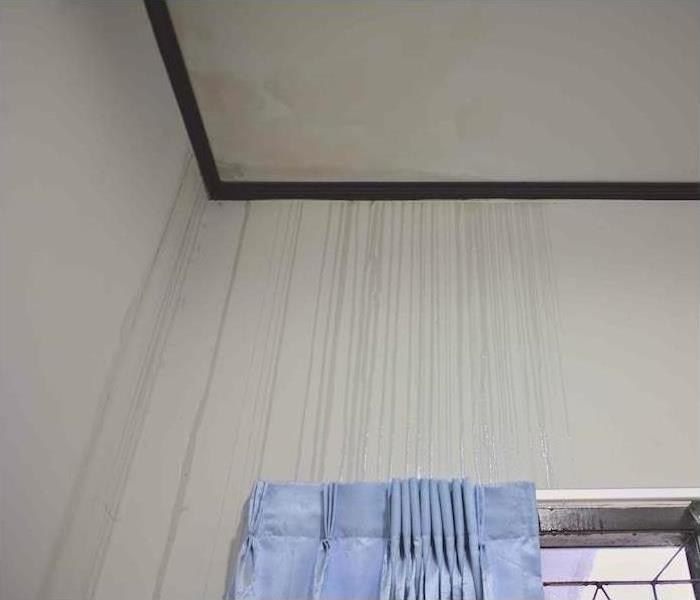 It’s important to educate yourself about home systems that are designed to prevent water from entering your home.
It’s important to educate yourself about home systems that are designed to prevent water from entering your home.
The perks of owning your own home are great but it also brings a lot of responsibility. Homes are built in a way to provide maximum protection from water intrusion but sometimes those methods fail.
It’s important to educate yourself about home systems that are designed to prevent water from entering your home. Here are some of the most common points of failure in a home that could allow water to go where it shouldn’t:
- Faucets and Sinks. Faucets and sinks are places to check for leaks. Over time, the rubber gaskets in faucets can degrade which can lead to leaks. Sink drains are usually sturdy unless you have a clog and use too much plunger pressure to remove it. Too much pressure from plunging can damage seals, so always use caution.
- Disposals. Garbage disposals are one of the hardest working appliances, and they can spring a link. If you believe you have a leak, check out these tips for finding it.
- Gutters and Downspouts. Gutters and downspouts should be clean and free flowing. They should be inspected regularly and cleared of obstructions and debris. Downspouts should move water at least 30 inches away from the home, and the soil should also flow away from the home.
- Roof Damage. Falling limbs from trees are a real risk to roof systems. They can perforate the roof and damage or clog gutters. Shingles are especially susceptible to falling tree damage. Newer shingles are designed and constructed to be impact-resistant, hopefully reducing the need for expensive roof repairs. But shingles degrade over time, and a falling tree or limb can easily damage an aged shingle.
- Sewer Line Obstruction. This is a serious issue and usually takes a professional plumber to resolve it. Sewer lines can clog for a number of reasons, but two of the most common are root intrusion and grease buildup.
- Sump Pump Defect. A sump pump is designed to move water from a basement or crawlspace to outside the home into a drainage system. When a sump pump fails, water backups can affect your home quickly.
Water Damage Can Leave Odors
4/23/2024 (Permalink)
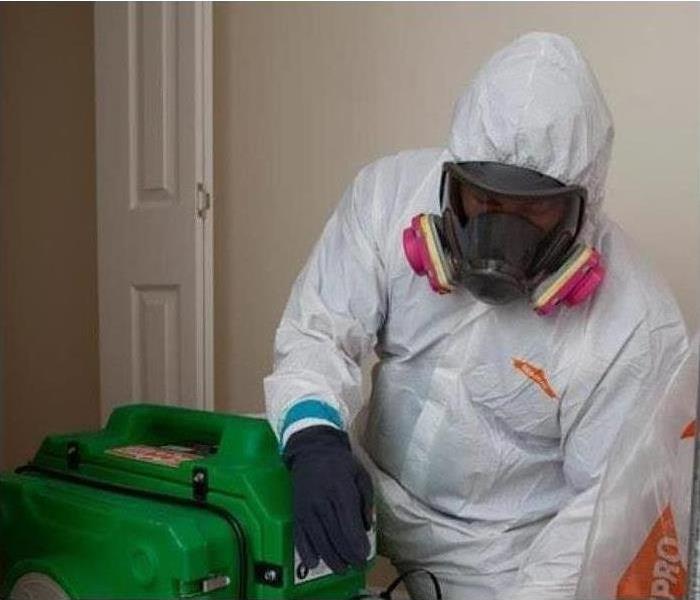 You can’t always see water damage, but you can always smell it.
You can’t always see water damage, but you can always smell it.
You can’t always see water damage, but you can always smell it. Most water damage odors are hard to ignore and alert you that there is damage in your home. Odors from water damage can be noticeable immediately or can occur sometime after the water is removed. Here are some common odors:
- Muddy smell: If outdoor flooding has entered the home, you may notice an earthy smell associated with lakes.
- Sewage smell: If water damage in your home is a result of a backed-up sewer, you will immediately notice the odor of raw sewage.
- Musty odors: Musty odors occur after the fact. This is a sign that mold is growing in your home.
Always remember to trust your nose. If it smells wrong, it probably is. The sooner you notice the problem, the sooner we can help. A highly trained SERVPRO professional can access the degree of your damage. To get rid of the odor in your home, our franchise professionals will find the source of the odor and determine the best methods to neutralize and eliminate the odor from your home.
Unexpected Hazards of a Leaky Roof
1/24/2024 (Permalink)
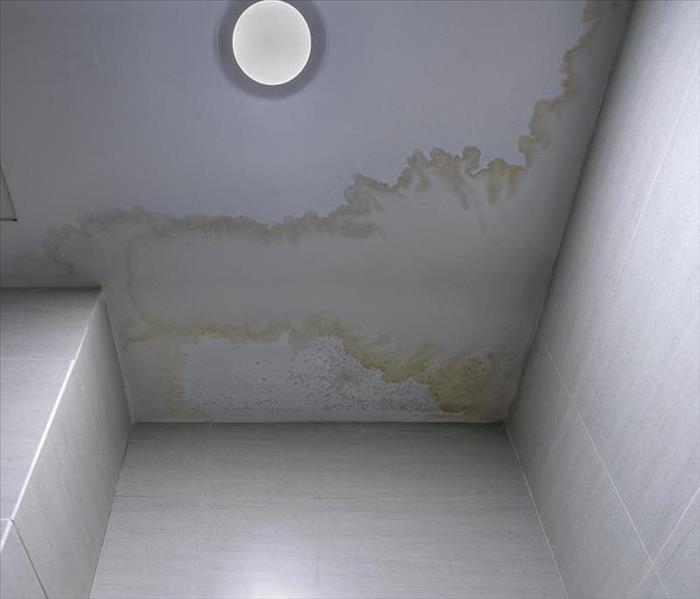 A leaky roof is a household problem that should never be put off.
A leaky roof is a household problem that should never be put off.
As a homeowner, you may be guilty of putting off household problems such as cleaning your appliances and changing your furnace filter. However, a leaky roof is a household problem that should never be put off. Whether your roof is leaking due to storm damage or improper installation, it must be taken care of right away.
Many homeowners think a leaky roof is due to structural problems, but it can pose safety and health risks to everyone in the household. Consistent water intrusion will work its way down from the attic to the foundation of the house, causing extensive and costly damage.
Here are some unexpected ways a leaky roof can damage your home:
- Attic and Ceiling Damage – A leaky roof can damage ceiling paint, causing the ceiling plaster to bubble and expand. The water can also damage paint and plaster on the surrounding walls. You can expect damage to ceiling-mounted lights and fans as well.
- Fire Hazards – If your electrical wiring is present in your attic or ceiling, a leaky roof can pose a fire risk from shorted wires. It is highly advised to turn off electricity to the area that is affected immediately and have an electrician examine it.
- Slip and Fall Hazard – A leaky roof can cause water to puddle on the floor. This doesn’t seem like a huge risk, but anyone in your household could slip and fall, potentially hurting themselves.
- Higher Utility Bills – Water intrusion can be damaging to the insulation in your attic area, potentially causing your home to lose hot and cool air in your home. This issue will result in higher utility bills and no homeowner wants that.
- Compromised Structure - Prolonged roof leaks lead to wood deterioration and weakening. Rotted roof framing causes serious problems that require help from a professional contractor. Homeowners can also face expensive wood framing repairs if water seeps down into ceiling joists and walls.
Potential Causes of Water Damage in Your Home
1/3/2024 (Permalink)
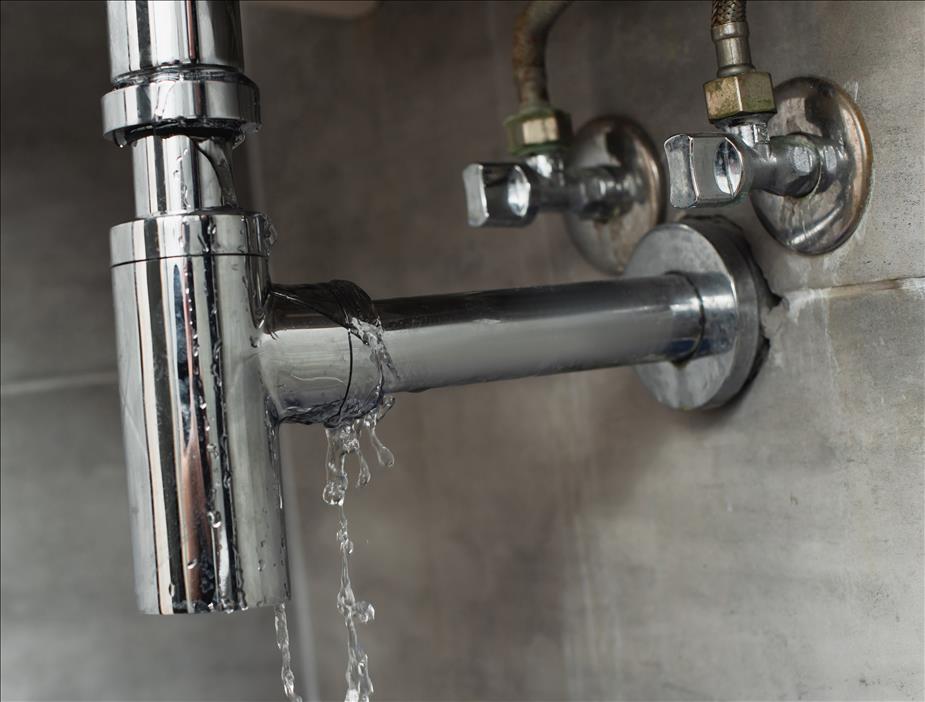 Several circumstances can be the cause of water damage in your home.
Several circumstances can be the cause of water damage in your home.
Being a homeowner, you know disasters can happen. Several circumstances can be the cause of water damage in your home. From leaking pipes to defective appliances, it is crucial to recognize potential water damage causes. Below are a few of the causes of water damage in your home.
- Dishwasher - Your dishwasher can cause water damage if not properly sealed, the latch is broken, or it was loaded with the wrong soap. Make sure any leaks are immediately addressed and your dishwasher is repaired or replaced ASAP.
- Washing Machine - The same goes for your washing machine. Perform regular checks, inspecting beneath the unit as well as behind it. Make sure all fittings are securely connected, and there are no leaks underneath. If you have an older washing machine that gives you frequent issues, consider replacing it with a more efficient model.
- Air Conditioner - Your A/C removes moisture from the air and moisture can build up within the unit itself. If not properly drained, that water could slowly leak into your home potentially ruining the flooring and drywall and, in many cases, introducing mold, which is always an emergency water cleanup situation.
- Leaking Pipes - If you notice water pooling in the kitchen or bathroom, you may be dealing with a loose-fitting pipe under sink. Don’t wait to call a plumber. One leak can be a sign of other leaks in the home, too.
- Clogged Drains - Clogged drains aren’t just annoying—they also cause water damage (and mold growth) if left unchecked. A clogged toilet can cause water to back up into the shower, sinks, or bathroom floor. Sewer water is extremely dangerous because it contains raw sewage and bacteria, requiring help from water damage cleanup companies.
Winter Water Damage
12/19/2023 (Permalink)
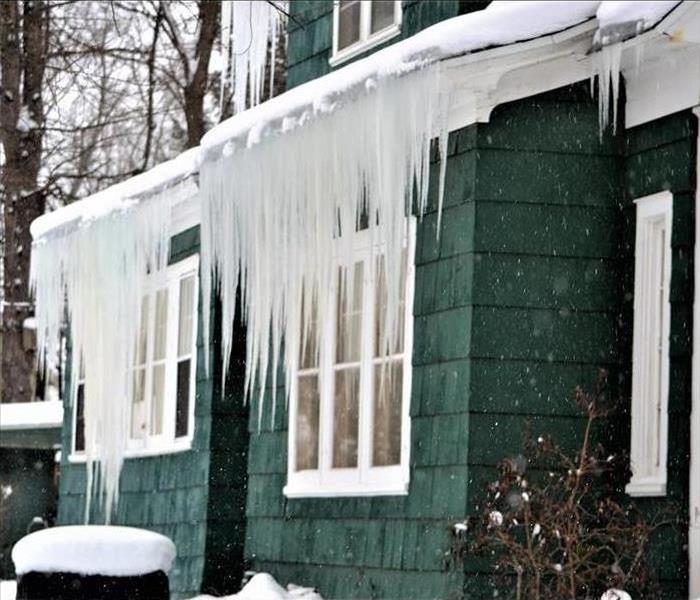 With below freezing temperatures, snow, and ice, your home or business could be in jeopardy of water damage.
With below freezing temperatures, snow, and ice, your home or business could be in jeopardy of water damage.
Michigan winters are known to be brutally cold and large amounts of snow are always expected. With below freezing temperatures, snow, and ice, your home or business could be in jeopardy of water damage. It is crucial that you are aware of the hazards and can prepare, prevent or act quickly if faced with winter water damage.
FROZEN PIPES
A frozen pipe can burst at the point where the ice blockage inside the pipe is located, but typically the rupture is caused by the backflow pressure between the water source and the blockage. A burst pipe can cause considerable damage to your property if not addressed quickly.
ICE DAMS
Ice dams can be a major problem during the winter season. They form when heated air melts roof snow downward into water dammed behind still-frozen ice. When the trapped water cannot safely flow or run into the gutter system, it can backflow under the roof ’s shingles and into the structure’s interior areas.
Cold weather, snow, and ice storms can cause severe damage to your home or business. When these types of disasters strike, immediate action is necessary to prevent additional damage to your property. Our team has winter storm experience, expertise, and the resources to remediate damage caused by winter weather. If disaster strikes your home or business during the winter months, know that SERVPRO® has your back.
Sewage Back Up Tips
9/10/2023 (Permalink)
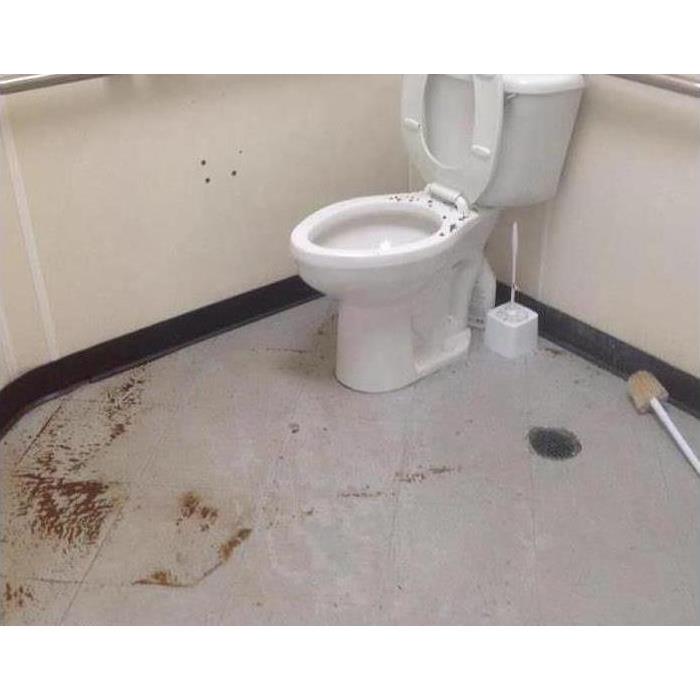 Water from sewer system backups should be considered very dangerous.
Water from sewer system backups should be considered very dangerous.
Water damage in your home is devastating, especially cleaning up areas of your home after flooding and sewer damage. Water from sewer system backups should be considered very dangerous. The water is grossly unsanitary and may contain bacteria and viruses that could cause serious illness. Special training and equipment are necessary to safely clean this type of contamination.
If you ever face a sewage backup in your bathroom, there are a few things that are helpful to know to speed proper cleanup and ensure a safe and sanitary home for your family.
- Call for Help - If you suspect you have damaged sewer lines, call your sewage company to schedule an inspection. To protect your home from future mold or rot issues after a toilet overflow, call flood damage remediation experts. Only with the help of professional water removal specialists can you rest assured that floodwater has not crept into places you cannot see to wreak havoc.
- Dry the Area - Though you may be tempted to sanitize your bathroom immediately after a toilet overflows, you should not do so before you start drying out the affected area. Whether you are dealing with a flooded toilet or an entire flooded basement, the first thing you should do is utilize heavy duty vacuums, drainage systems and fans to remove all the water.
- Sanitize - After drying the area, sanitize it as best you can. Floodwater resulting from sewer damage can be toxic, so be thorough in your cleaning processes. Once the area is dry from the first round of sanitizer, you should plan to disinfect it one more time.
- Dehumidify - The presence of excess water in a bathroom often welcomes lingering humidity, which only encourages mold growth in spaces affected by sewer water. During the process of drying, sanitizing, and restoring, you should be sure that a dehumidifier is always running.
Water Damage to Hardwood Floors
6/6/2023 (Permalink)
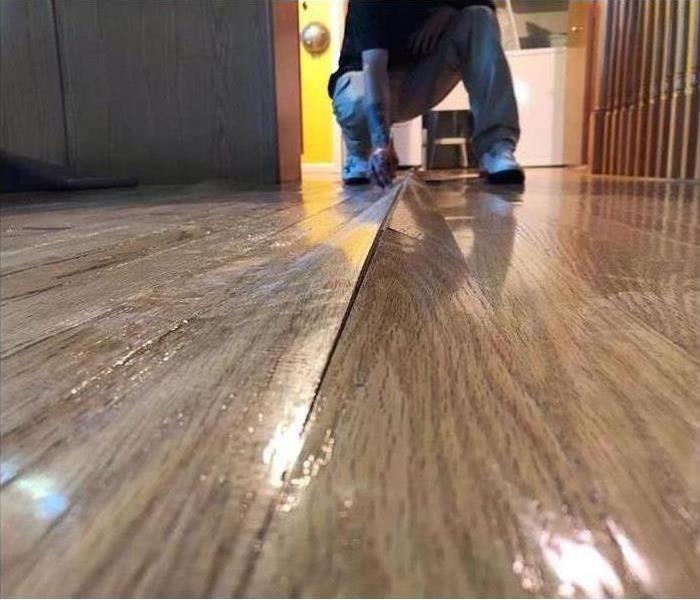 While it is possible to save your water-damaged hardwood flooring, time is a critical factor.
While it is possible to save your water-damaged hardwood flooring, time is a critical factor.
How Water Warps Hardwood Flooring
When water floods areas with hardwood floors, the material tries to absorb the water. Excessive moisture forces the wood to expand, which can cause warping or cupping. Here at SERVPRO, we always encourage water damage victims to extract as much water as possible while they wait for help to arrive.
Saving Wet Hardwood Floors
In some cases, we can save your hardwood floors. If the water is quickly extracted and there is not significant warping, then we can use a drying process specifically designed for hardwood floors. But if the flooring was exposed to moisture for a significant period and shows major signs of warping, then your hardwood will need to be removed and replaced.
Call the Professionals Before It is Too Late
While it is possible to save your water-damaged hardwood flooring, time is a critical factor. If you notice water damage in your home, call a professional cleanup and restoration company like our team here at SERVPRO. We offer 24/7 emergency restoration services and can get your floors back to preloss condition.
 It’s important to educate yourself about home systems that are designed to prevent water from entering your home.
It’s important to educate yourself about home systems that are designed to prevent water from entering your home.





 24/7 Emergency Service
24/7 Emergency Service





